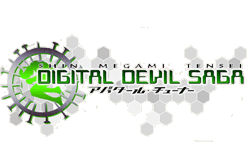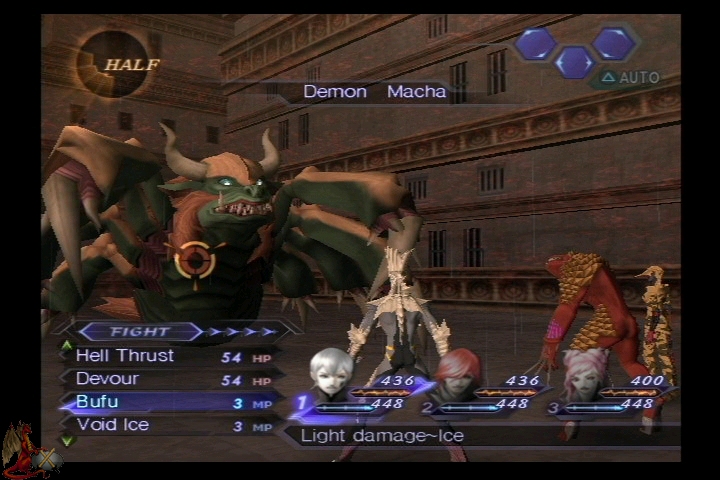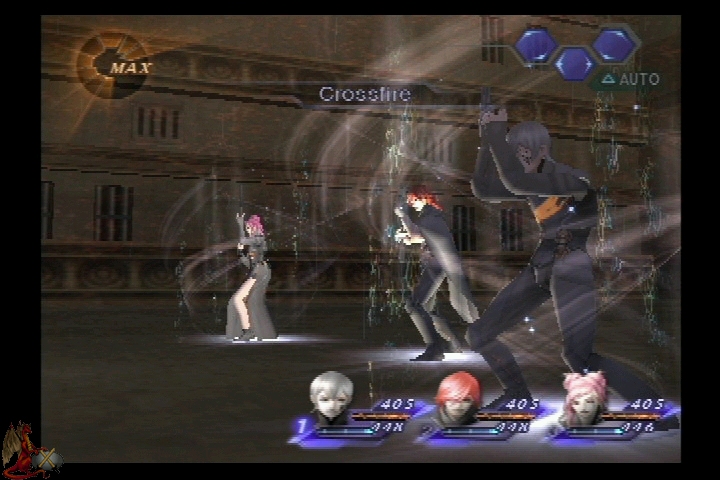|
|

|
BATTLE SYSTEM
|

|
INTERACTION
|

|
ORIGINALITY
|

|
STORY
|

|
MUSIC & SOUND
|

|
VISUALS
|

|
CHALLENGE
|
Variable
|
COMPLETION TIME
|
25-75+ Hours
|
|
OVERALL
4.0/5
|
Rating definitions
|
|
|
In a mysterious, dreary city known as the Junkyard, rival tribes are battling one another for the right to ascend to Nirvana. After a mysterious light appears, however, many in the Junkyard begin turning into demons, although Serph, the silent leader of the Embryon, and his allies, quickly find themselves able to control their new demonic powers, and use them to their advantage on their quest for Nirvana. Shin Megami Tensei: Digital Devil Saga proves to be a solid addition to Atlus' franchise, and might just draw newcomers to the series.
Instead of featuring a demon-capturing system like Shin Megami Tensei: Nocturne, DDS instead opts for a fixed party of up to five acquirable characters (with three able to participate in battle at once), as well as an ability system that plays like an effective hybrid of the Esper system of Final Fantasy VI and the Sphere Grid system of Final Fantasy X known as the Mantra Grid. Each character, for a price, can download a Mantra from the grid, which, when mastered, earns that character abilities and opens paths on the grid to more powerful, and more costly, Mantras.
Enemies are randomly (and frequently) encountered in dungeons, with each of the three active characters typically starting fights in their demon forms. However, in case of occasional enemy ambushes, the characters will start in their human forms, where they can only fire their guns, use items, and use combination attacks gained when each characters has certain skills equipped (and consume a certain number of turn icons depending on the number of characters involved). They can, however, still transform into their demon forms, where they can use their special abilities (and more diverse combos), with each character at first able to equip four skills, although this limit ultimately increases to eight with increased levels.
 "Hey! Who ordered this stupid cow-spider?"
"Hey! Who ordered this stupid cow-spider?"
|
|
Fights themselves make use of the innovative Press Turn Icon system introduced in Nocturne; the player's active party has a certain number of turn icons depending on how many characters are alive (up to three). Exploiting an enemy's weakness consumes only half a turn icon (as does "passing" a turn), although voided attacks consume two whole turn icons, and repelled and drained attacks consume all the player's turn icons. This works for the enemies, as well, and the player, at times, must defend the party's own weaknesses.
Victory results in acquiring experience, money, and Atma Points for each character's equipped Mantra. Characters can also make use of Devour skills, where they can consume enemies for boosted Atma Points (enemies that are "afraid," usually as a result of having their weaknesses exploiting or using skills that your party voids, repels, or drains, are more easily devoured). Devouring enemies, however, can give characters stomachaches, in which case they won't gain Atma Points after a battle, although a simple healing item (and a skill) can cure the ailment.
In spite of the high encounter rate, most normal encounters rarely exceed more than half a minute in spite of the strategy needed, as long as your party's skills are sufficient. There are a few shortcomings, however, such as the high encounter rate, the potential unbalance of combat if you don't plan your characters' Mantra Grid paths (in which case the difficulty can certainly vary), and that switching in characters in battle consumes turn icons. Nonetheless, combat in DDS, in addition to the solid ability system, is one of the main draws to the game.
 Serph and company pay a visit to CNN
Serph and company pay a visit to CNN
|
|
DDS's interface is spotless for the most part, with easily navigable menus, stackable items, and no equipment to worry about. Saving and Mantra download are done at Karma Terminals, Large and Small; Large Karma Terminals allow for rapid conveyance among other Large Karma Terminals in a dungeon and party recovery (which costs money), and Small Karma Terminals allow one-way trips to any Large Karma Terminal albeit without party recovery. Life Terminals provide for party recovery for a price only, and rare Rejuvenating Lights provide free healing. Moreover, automaps allow players to find their way through dungeons and backtrack if necessary.
There are also Vendors from whom players can purchase consumable items and bullets for their characters' guns. Enemies, and some treasure boxes, also provide Cells occasionally, with the player able to sell them for good money at Vendors and ultimately unlock better buyable items. The only real problem with interaction is that the spacing of save points, coupled with the often-high encounter rate, can sometimes cause problems, since many enemies can kill your party easily, resulting in wasted progress at times. Otherwise, there are no other complaints.
DDS's story is what mainly sets it apart from other RPGs, although its gameplay somewhat derivative, filching elements from the sixth and tenth Final Fantasies as well as Shin Megami Tensei: Nocturne, although the Devour system is mildly inventive.
The plot itself focuses mostly on the conflict between the tribes of the Junkyard though not the characters themselves, yet there are a few decent twists. Given the volume of most dungeons, however, cutscenes at times can be far apart and sometimes brief, though there are certainly a few well-developed story scenes. Overall, the story in DDS is good, although there's not enough of it.
 Mmm, fiber!
Mmm, fiber!
|
|
Composer Shoji Meguro finds a sound kit with his music for DDS, providing some rocky, jazzy themes, with the battle music, especially a particular boss theme, standing out the most; the music's presentation, though, can be somewhat weak at times. The presentation of the voicework, however, is close to flawless; DDS, without a doubt, features perhaps the best voice acting ever to appear in any RPG to date. All in all, the voice acting, in addition to the decent music, makes for a very nice-sounding game.
DDS features gothic cel-shaded visuals similar to those in Nocturne, with superb character and monster designs, as well as colors nicely exemplifying the dreariness of the Junkyard. The visuals, though, suffer from the typical "jaggies" seen in many other 3-D graphics, although they're certainly one of the game's many draws.
Depending upon whether or not players wish to completely map every dungeon, fight the extra bosses, and/or have fun mastering Mantras, they can find themselves occupied anywhere from twenty-five to seventy-five hours, with New Cycles allowing for subsequent playthroughs if desired (though there will certainly be some that will immediately want to start on the sequel). Ultimately, Digital Devil Saga is a worthy, perhaps far more polished, addition to the Shin Megami Tensei franchise, sure to please the series' fans; even those who didn't enjoy previous installments might want to give this more mainstream iteration of the franchise a look.
Review Archives
|









